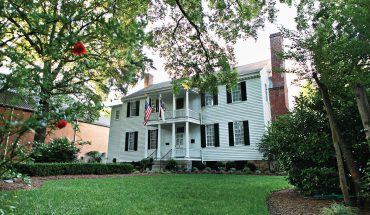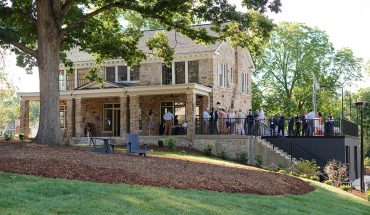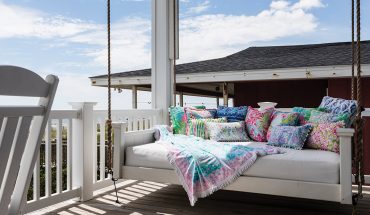A Raleigh nonprofit provides creative jobs for at-risk women to build references and artisan skills.
by Catherine Currin | photography by Eamon Queeney

“She believed she could, so she did.” So reads a quote by author R.S. Grey that’s on display inside Designed For Joy (DFJ), a nonprofit in Boylan Heights that creates living-wage artisan jobs for at-risk women, including victims of sex or labor trafficking, sexual assault and domestic violence. The quote encapsulates the courage and drive behind an organization where women are on a mission to help other women restore confidence in themselves.
At its core, Designed for Joy believes in second chances. It helps to rebuild futures by teaching women artisan skills and providing a reliable reference for them to successfully join the job market. Co-founder Cary Heise was inspired to create DFJ after a mission trip to Rwanda, where she learned of an artisan group that took 30 prostitutes off the street and provided them with jobs. She used her experience as an entrepreneur, combined with co-founder Kristen Sydow’s background in fashion and textiles, to create a similar business model. For Heise, it’s the perfect marriage between business savvy and mission life. Centered around a strong faith, the studio begins each day with devotion and prayer, but notes that the organization is all-inclusive. “You don’t have to be a believer in Christ to work here or to volunteer, but this is where our inspiration, and probably our tenacity, comes from,” she says.
Heise considers DFJ a vocational resource, part of a holistic approach to rebuilding lives. “When someone is coming from generational poverty, it’s really hard to bounce back from even one speeding ticket, one arrest, or one illness.” The studio partners with area ministries and charitable organizations such as Healing Transitions, The Salvation Army and Caring Connections Ministry to provide a strong support network for the women in their program as they train to be artisans. This helps create a wide-ranging foundation—from spiritual and mental aid to housing accommodations—to buttress the women as they work to restore their lives.

The Cabarrus Street studio designs and makes jewelry, handbags and home accessories. Each piece of jewelry features a name on the tag, either a woman who created the product from start to finish or one who was a part of the product assembly process. At vendor events, the participants tell stories of how their lives have changed for the better, even if they’re not ready to share their names.
One current artisan, Facial Archer, found herself homeless after battling drug addiction, the death of her husband, and incarceration. Facing additional health issues, she had trouble keeping a job. But her eyes brighten while telling her own story: At Designed for Joy, she was met with love and compassion, which allowed her to let go of lingering shame. “The past wasn’t so haunting,” Archer says. “I don’t have to be the thing that I was. I can be a productive citizen in society.”

The partnerships DFJ has established build strong local ties. “We love knowing we’re contributing directly to downtown Raleigh’s economy and all of the other good works everybody is doing,” says Heise. And customers are happy to be a part of a retail experience that helps the community. “They are excited about the impact we’re making, especially when they hear the personal stories from the women here in Raleigh whose lives are being affected just through the purchase of a pair of earrings.”
Even though the business is young, it’s making significant strides. Since its opening in 2017, Designed for Joy has paid more than 1,300 hours of living wages, along with providing workshops and meals to its participants. Heise says humbly that Designed for Joy is just one of many organizations doing great work in Raleigh. “We’re just finding creative and unique ways to better our community.”
Friday—Saturday 10 a.m. – 2 p.m.; designedforjoy.com



